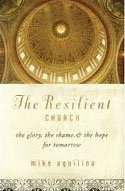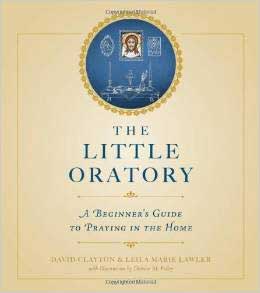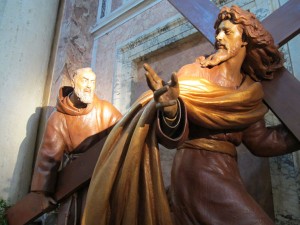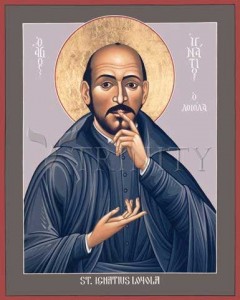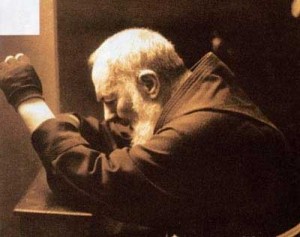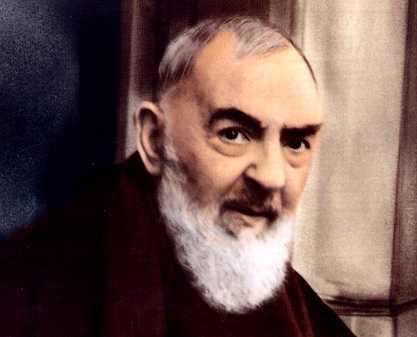USCCA44 Â Chapter 35-Â God Calls Us To Pray – The Foundations of Prayer pt 1
[powerpress]
Archbishop Lucas offers insights on the US Catholic Catechism for Adults Chapter 35:
Descriptions of prayer are abundant throughout Christian history. “True prayer,†wrote St. Augustine, “is nothing but love.†Prayer should arise from the heart. “Prayer,†said St. John Vianney, “is the inner bath of love into which the soul plunges itself.†“Everyone of us needs half an hour of prayer each day,†remarked St. Francis de Sales, “except when we are busy—then we need an hour.†Definitions of prayer are important, but insufficient. There is a huge difference between knowing about prayer and praying. On this issue, the Rule of St. Benedict is clear: “If a man wants to pray, let him go and pray.â€
St. John Damascene gave a classic definition of prayer: “Prayer is the raising of one’s mind and heart to God or the requesting of good things from God†(CCC, no. 2559, citing St. John Damascene, De Fide Orth. 3, 24).
The Catechism clearly defines prayer as a “vital and personal relationship with the living and true God†(CCC, no. 2558). Prayer is Christian “insofar as it is communion with Christ†(CCC, no. 2565), and a “covenant relationship between God and man in Christ†(CCC, no. 2564).
United States Conference of Catholic Bishops (USCCB) (2012-04-02). United States Catholic Catechism for Adults (Kindle Locations 6658-6667). United States Conference of Catholic Bishops (USCCB). Kindle Edition.
The Most Reverend George J. Lucas leads the Archdiocese of Omaha.Â
For other episodes in the visit our Archbishop George Lucas page
This programs is based on:
More information can be found here.
We wish to thank the USCCB for the permissions granted for use of  relevant material used in this series.
Tags: catholic, catholic podcast, catholic prayer, cathollc spirituality
This entry was posted on Thursday, September 25th, 2014 at 2:44 pm
You can follow any responses to this entry through the RSS 2.0 feed.
Dr. Matthew Bunson discusses the life, times and teachings of St. Hildegard von Bingen
Born: September 16, 1098, Bermersheim vor der Höhe, Germany
Died: September 17, 1179, Bingen am Rhein, Germany
Film music credits: Vision – From the Life of Hildegard von Bingen
From Vatican.va, an excerpt from the teachings of Pope Benedict XVIÂ
APOSTOLIC LETTER
Proclaiming Saint Hildegard of Bingen,
professed nun of the Order of Saint Benedict,
a Doctor of the Universal Church
5. Hildegard’s anthropology begins from the biblical narrative of the creation of man (Gen 1:26), made in the image and likeness of God. Man, according to Hildegard’s biblically inspired cosmology, contains all the elements of the world because the entire universe is recapitulated in him; he is formed from the very matter of creation. The human person can therefore consciously enter into a relationship with God. This does not happen through a direct vision, but, in the words of Saint Paul, as “in a mirror†(1 Cor 13:12). The divine image in man consists in his rationality, structured as intellect and will. Thanks to his intellect, man can distinguish between good and evil; thanks to his will, he is spurred to action.
Human beings are seen as a unity of body and soul. The German mystic shows a positive appreciation of corporeity and providential value is given even to the body’s weaknesses. The body is not a weight from which to be delivered. Although human beings are weak and frail, this “teaches†them a sense of creatureliness and humility, protecting them from pride and arrogance. Hildegard contemplated in a vision the souls of the blessed in paradise waiting to be rejoined to their bodies. Our bodies, like the body of Christ, are oriented to the glorious resurrection, to the supreme transformation for eternal life. The very vision of God, in which eternal life consists, cannot be definitively achieved without the body.
The human being exists in both the male and female form. Hildegard recognized that a relationship of reciprocity and a
substantial equality between man and woman is rooted in this ontological structure of the human condition. Nevertheless the mystery of sin also dwells in humanity, and was manifested in history for the first time precisely in the relationship between Adam and Eve. Unlike other medieval authors who saw Eve’s weakness as the cause of the Fall, Hildegard places it above all in Adam’s immoderate passion for her.
Even in their condition as sinners, men and women continue to be the recipients of God’s love, because God’s love is unconditional and, after the Fall, acquires the face of mercy. Even the punishment that God inflicts on the man and woman brings out the merciful love of the Creator. In this regard, the most precise description of the human creature is that of someone on a journey, homo viator. On this pilgrimage towards the homeland, the human person is called to a struggle in order constantly to choose what is good and avoid evil.
The constant choice of good produces a virtuous life. The Son of God made man is the subject of all virtues, therefore the imitation of Christ consists precisely in living a virtuous life in communion with Christ. The power of virtue derives from the Holy Spirit, poured into the hearts of believers, who brings about upright behaviour. This is the purpose of human existence. In this way man experiences his Christ-like perfection.
6. So as to achieve this goal, the Lord has given his Church the sacraments. Salvation and the perfection of the human being are not achieved through the effort of the will alone, but rather through the gifts of grace that God grants in the Church.
The Church herself is the first sacrament that God places in the world so that she may communicate salvation to mankind. The Church, built up from “living soulsâ€, may rightly be considered virgin, bride and mother, and thus resembles closely the historical and mystical figure of the Mother of God. The Church communicates salvation first of all by keeping and proclaiming the two great mysteries of the Trinity and the Incarnation, which are like the two “primary sacramentsâ€; and then through administration of the other sacraments. The summit of the sacramental nature of the Church is the Eucharist. The sacraments produce the sanctification of believers, salvation and purification from sin, redemption and charity and all the other virtues. However, to repeat, the Church lives because God within her has manifested his intraTrinitarian love, which was revealed in Christ. The Lord Jesus is the mediator par excellence. From the Trinitarian womb he comes to encounter man and from Mary’s womb he encounters God. As the Son of God, he is love incarnate; as the Son of Mary, he is humanity’s representative before the throne of God.
The human person can have an experience of God. Relationship with him, in fact, is not lived solely in the sphere of rationality, but involves the person totally. All the external and internal senses of the human being are involved in the experience of God. “But man was created in the image and likeness of God, so that he might act through the five bodily senses; he is not divided by them, rather through them he is wise, knowledgeable and intelligent in doing his work (…). For this very reason, because man is wise, knowledgeable and intelligent, he knows creation; he knows God — whom he cannot see except by faith — through creation and his great works, even if with his five senses he barely comprehends them†(Explanatio Symboli Sancti Athanasii in PL 197, 1073). This experiential process finds once again, its fullness in participation in the sacraments.
Hildegard also saw contradictions in the lives of individual members of the faithful and reported the most deplorable situations. She emphasized in particular that individualism in doctrine and in practice on the part of both lay people and ordained ministers is an expression of pride and constitutes the main obstacle to the Church’s evangelizing mission to non-Christians.
One of the salient points of Hildegard’s magisterium was her heartfelt exhortation to a virtuous life addressed to consecrated men and women. Her understanding of the consecrated life is a true “theological metaphysicsâ€, because it is firmly rooted in the theological virtue of faith, which is the source and constant impulse to full commitment in obedience, poverty and chastity. In living out the evangelical counsels, the consecrated person shares in the experience of Christ, poor, chaste and obedient, and follows in his footsteps in daily life. This is fundamental in the consecrated life.
7. Hildegard’s eminent doctrine echoes the teaching of the Apostles, the Fathers and writings of her own day, while it finds a constant point of reference in the Rule of Saint Benedict. The monastic liturgy and the interiorization of sacred Scripture are central to her thought which, focusing on the mystery of the Incarnation, is expressed in a profound unity of style and inner content that runs through all her writings.
The teaching of the holy Benedictine nun stands as a beacon for homo viator. Her message appears extraordinarily timely in today’s world, which is especially sensitive to the values that she proposed and lived. For example, we think of Hildegard’s charismatic and speculative capacity, which offers a lively incentive to theological research; her reflection on the mystery of Christ, considered in its beauty; the dialogue of the Church and theology with culture, science and contemporary art; the ideal of the consecrated life as a possibility for human fulfilment; her appreciation of the liturgy as a celebration of life; her understanding of the reform of the Church, not as an empty change of structure but as conversion of heart; her sensitivity to nature, whose laws are to be safeguarded and not violated.
For these reasons the attribution of the title of Doctor of the Universal Church to Hildegard of Bingen has great significance for today’s world and an extraordinary importance for women. In Hildegard are expressed the most noble values of womanhood: hence the presence of women in the Church and in society is also illumined by her presence, both from the perspective of scientific research and that of pastoral activity. Her ability to speak to those who were far from the faith and from the Church make Hildegard a credible witness of the new evangelization.
By virtue of her reputation for holiness and her eminent teaching, on 6 March 1979 Cardinal Joseph Höffner, Archbishop of Cologne and President of the German Bishops’ Conference, together with the Cardinals, Archbishops and Bishops of the same Conference, including myself as Cardinal Archbishop of Munich and Freising, submitted to Blessed John Paul II the request that Hildegard of Bingen be declared a Doctor of the Universal Church. In that petition, the Cardinal emphasized the soundness of Hildegard’s doctrine, recognized in the twelfth century by Pope Eugene III, her holiness, widely known and celebrated by the people, and the authority of her writings. As time passed, other petitions were added to that of the German Bishops’ Conference, first and foremost the petition from the nuns of Eibingen Monastery, which bears her name. Thus, to the common wish of the People of God that Hildegard be officially canonized, was added the request that she be declared a “Doctor of the Universal Churchâ€.
With my consent, therefore, the Congregation for the Causes of Saints diligently prepared a Positio super Canonizatione et Concessione tituli Doctoris Ecclesiae Universalis for the Mystic of Bingen. Since this concerned a famous teacher of theology who had been the subject of many authoritative studies, I granted the dispensation from the measures prescribed by article 73 of the Apostolic Constitution Pastor Bonus. The cause was therefore examined and approved by the Cardinals and Bishops, who met in Plenary Session on 20 March 2012. The proponent (ponens) of the cause was His Eminence Cardinal Angelo Amato, Prefect of the Congregation for the Causes of Saints. At the audience of 10 May 2012, Cardinal Amato informed us in detail about the status quaestionis and the unanimous vote of the Fathers at the above-mentioned Plenary Session of the Congregation for the Causes of Saints. On 27 May 2012, Pentecost Sunday, I had the joy of announcing to the crowd of pilgrims from all over the world gathered in Saint Peter’s Square the news of the conferral of the title of Doctor of the Universal Church upon Saint Hildegard of Bingen and Saint John of Avila at the beginning of the Assembly of the Synod of Bishops and on the eve of the Year of Faith.
Today, with the help of God and the approval of the whole Church, this act has taken place. In Saint Peter’s Square, in the presence of many Cardinals and Prelates of the Roman Curia and of the Catholic Church, in confirming the acts of the process and willingly granting the desires of the petitioners, I spoke the following words in the course of the Eucharistic sacrifice: “Fulfilling the wishes of numerous brethren in the episcopate, and of many of the faithful throughout the world, after due consultation with the Congregation for the Causes of Saints, with certain knowledge and after mature deliberation, with the fullness of my apostolic authority I declare Saint John of Avila, diocesan priest, and Saint Hildegard of Bingen, professed nun of the Order of Saint Benedict, to be Doctors of the Universal Church. In the name of the Father, and of the Son, and of the Holy Spirit.
For more visit Vatican.va
For more from Dr. Matthew Bunson check out his Discerning Hearts page
Dr. Matthew Bunson, Senior Fellow of the St. Paul Center for Biblical Theology, is one of the United States’ leading authorities on the papacy and the Church.
His books include: The Encyclopedia of Catholic History; The Encyclopedia of Saints; Papal Wisdom; All Shall Be Well; Encyclopedia of the Roman Empire; and The Angelic Doctor: The Life and World of St. Thomas Aquinas; The Pope Encyclopedia; We Have a Pope! Benedict XVI, the first Catholic biography of the Holy Father in the English language; the Encyclopedia of U.S. Catholic History; Pope Francis. His also the editor of OSV’s “The Catholic Answer” magazine.
Tags: catholic, catholic podcast, catholic prayer, cathollc spirituality
This entry was posted on Thursday, September 25th, 2014 at 2:26 pm
You can follow any responses to this entry through the RSS 2.0 feed.
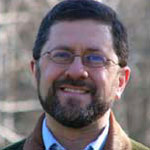 Episode 8– The Conversion of the New World
Episode 8– The Conversion of the New World
The Resilient Church with Mike Aquilina, offers a fascinating look at the trials and triumphs of the Catholic Church over the past two thousand years. Fast-paced sketches of critical periods in church history give readers perspective on the challenges faced by the church today. Mike Aquilina does not shrink from the realities of the past, including badly behaved leaders and those who betrayed the Lord. Yet he also leaves us all with well-founded hope for the future: God remains faithful in every circumstance and fulfills his promise to remain with his church always. Hosted by Kris McGregor
Also visit Mike’s “Discerning Hearts†page for more audio downloads and information!
Tags: catholic, catholic podcast, catholic prayer, cathollc spirituality
This entry was posted on Thursday, September 25th, 2014 at 2:08 pm
You can follow any responses to this entry through the RSS 2.0 feed.
[powerpress]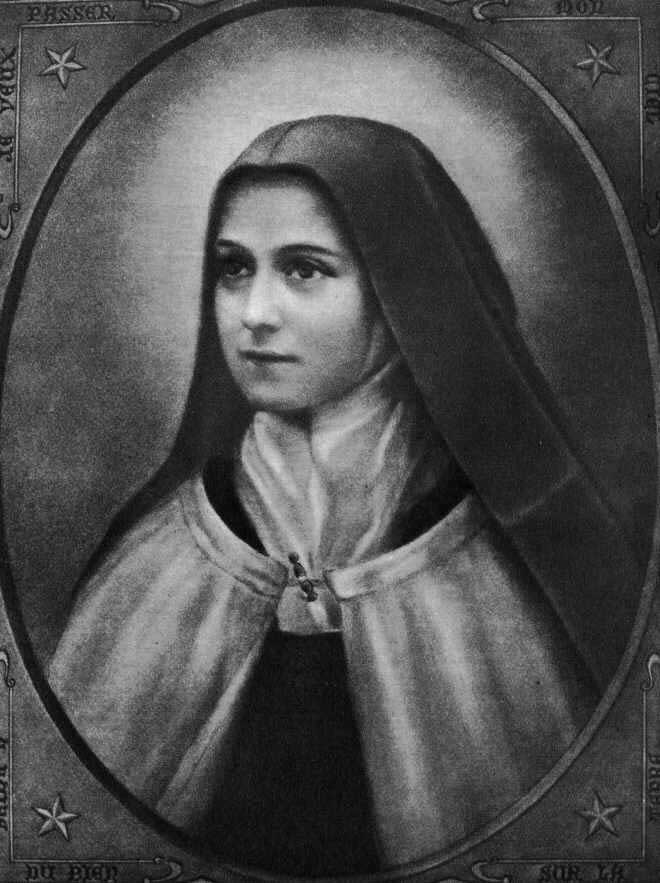
Day 3
St. Therese you have said:
“Miss no single opportunity of making some small sacrifice, here by a smiling look, there by a kindly word; always doing the smallest right and doing it all for love.â€
Saint Therese, flower of Carmel,
you said you would spend your heaven
doing good upon the earth.
Your trust in God was complete.
Listen to my prayer;
bring before God my special intention…
Pray for me that I may have something of your confidence
in the loving promises of our God.
Pray that I may live my life in union with God’s plan for me,
and one day see the Face of God who you so ardently loved.
Saint Therese,
you kept your word to love God
and to trust the world to that loving providence.
Pray for us that we may be faithful to our commitment to love.
May our lives, like yours,
be able to touch the world and bring it to peace.
Amen
Tags: catholic, catholic podcast, catholic prayer, cathollc spirituality
This entry was posted on Thursday, September 25th, 2014 at 12:07 am
You can follow any responses to this entry through the RSS 2.0 feed.
[powerpress]
Day 2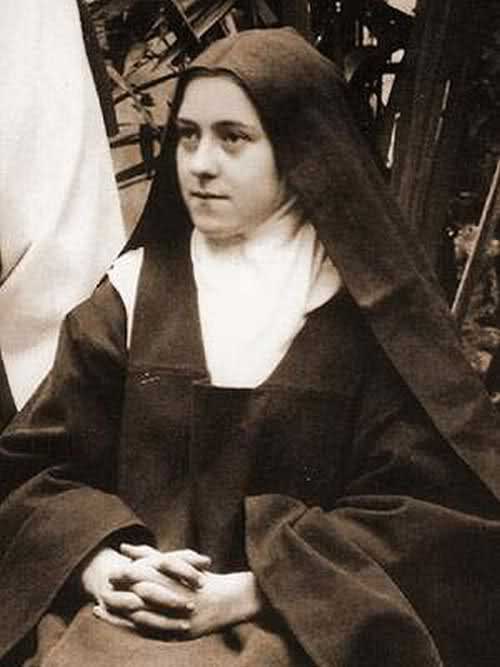
St. Therese you have said:
“If I did not simply live from one moment to another, it would be impossible for me to be patient, but I only look at the present, I forget the past, and I take good care not to forestall the future.â€
Saint Therese, flower of Carmel,
you said you would spend your heaven
doing good upon the earth.
Your trust in God was complete.
Listen to my prayer;
bring before God my special intention…
Pray for me that I may have something of your confidence
in the loving promises of our God.
Pray that I may live my life in union with God’s plan for me,
and one day see the Face of God who you so ardently loved.
Saint Therese,
you kept your word to love God
and to trust the world to that loving providence.
Pray for us that we may be faithful to our commitment to love.
May our lives, like yours,
be able to touch the world and bring it to peace.
Amen
Tags: catholic, catholic podcast, catholic prayer, cathollc spirituality
This entry was posted on Wednesday, September 24th, 2014 at 12:54 am
You can follow any responses to this entry through the RSS 2.0 feed.
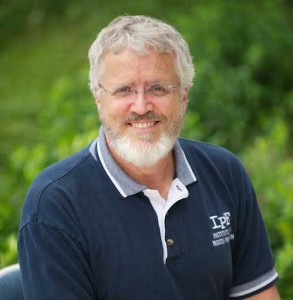 Episode 4 Salvation Begins Now: Last Things First – Â Deacon Keating discusses Heaven.
Episode 4 Salvation Begins Now: Last Things First – Â Deacon Keating discusses Heaven.
[powerpress]
From the Catechism of the Catholic Church:
1024   This perfect life with the Most Holy Trinity—this communion of life and love with the Trinity, with the Virgin Mary, the angels and all the blessed—is called “heaven.†Heaven is the ultimate end and fulfillment of the deepest human longings, the state of supreme, definitive happiness.
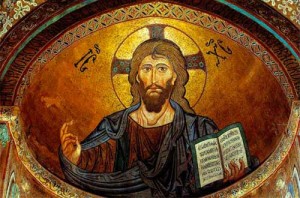
Deacon James Keating, PhD, the director of Theological Formation for the Institute for Priestly Formation, located at Creighton University, in Omaha.
For more information on the “Institute of Priestly Formation” and for other material available by Deacon Keating, just click here
Don’t forget to pickup a copy of “Communion with Christ” , it is one of the best audio sets on prayer…ever!
Check out Deacon Keating’s “Discerning Heart” page
Tags: catholic, catholic podcast, catholic prayer, cathollc spirituality, heaven
This entry was posted on Tuesday, September 23rd, 2014 at 1:25 pm
You can follow any responses to this entry through the RSS 2.0 feed.
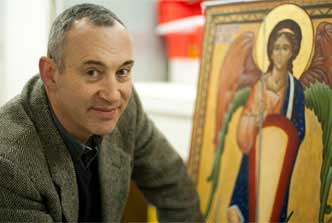 “The Little Oratory: A Beginner’s Guide to Praying in the Home” by David Clayton and Leila M. Lawler is absolutely wonderful.  More than just a “prayer-how-to”, this book is about the beauty of God and embracing the relationship in all areas of our lives.  Clayton and Lawler help us to reverence the sacred found in our homes, in the rhythm of the day, the blessings we have been given, and the gift of the present moment.  This is for every home, whether one filled with children or a sanctuary for the single life, this is a must have for those who wish to be surrounded in prayer.
“The Little Oratory: A Beginner’s Guide to Praying in the Home” by David Clayton and Leila M. Lawler is absolutely wonderful.  More than just a “prayer-how-to”, this book is about the beauty of God and embracing the relationship in all areas of our lives.  Clayton and Lawler help us to reverence the sacred found in our homes, in the rhythm of the day, the blessings we have been given, and the gift of the present moment.  This is for every home, whether one filled with children or a sanctuary for the single life, this is a must have for those who wish to be surrounded in prayer.
[powerpress]
You can find the book here
“This is one of the most beautiful books I have ever seen. How I wish I had it when I first became a Catholic, not just for myself, as a husband and father, but for my family, too. If one book has the potential to transform the Catholic family (and society), this is it.” – Scott Hahn
“This book is a rare treasure.” – Thomas Howard
“Wonderful, inspiring, and deeply practical.” – Joseph Pearce, Editor of The Saint Austin Review
“A great blessing to Catholic families.” – Stratford Caldecott, an editor of Magnificat UK
Tags: catholic, catholic podcast, catholic prayer, cathollc spirituality
This entry was posted on Tuesday, September 23rd, 2014 at 12:54 pm
You can follow any responses to this entry through the RSS 2.0 feed.
Episode 6 – St. Bonaventure – The Journey of the Mind into God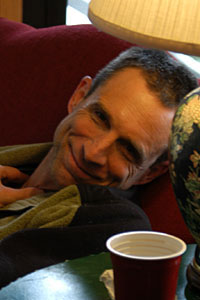
[powerpress]
Academic Theology and Contemplative Prayer
“The Journey of the Mind into God” -Â 3 basic phases
1. Seeing God in and through the World (looking outward) (stage 1 & 2) (The Nave)
2. Seeing God in and through the Self (looking inward)(stage 3 & 4) (The Choir)
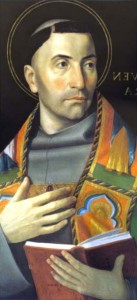 3. Seeing God in and through God Himself (looking upward) (stage 5 & 6) (The Altar)
3. Seeing God in and through God Himself (looking upward) (stage 5 & 6) (The Altar)
…and then (stage 7)The Sacrament Himself
Here is the PDF for the work of St. Bonaventure – “The Journey of the Mind into God”
“Christian Apologetics with Dr. R. R. Reno” explores numerous facets of faith and reason in the life of the Church and the world. Grounded on the work of giants, such as St. Thomas Aquinas, St. Bonaventure, Blessed John Newman, St. John Paul II, G. K. Chesterton, Blaise Pascal and Stephen Barr, Dr. Reno helps us to open our minds to make the journey to our hearts.
R. R. Reno is the editor at First Things: A Journal of Religion, Culture, and Public Life, and Professor of Theology, currently on leave from Creighton University. His theological work has been published in many academic journals. Essays and opinion pieces on religion, public life, contemporary culture, and current events have appeared in Commentary, and the Washington Post. In Fighting the Noonday Devil Reno suggests that putting ourselves at the disposal of what is real is what trains us for true piety. His other recent books include Genesis: Brazos Theological Commentary on the Bible and Sanctified Vision: An Introduction to Early Christian Interpretation of the Bible.
Tags: catholic, catholic podcast, catholic prayer, cathollc spirituality
This entry was posted on Tuesday, September 23rd, 2014 at 12:30 pm
You can follow any responses to this entry through the RSS 2.0 feed.
[powerpress]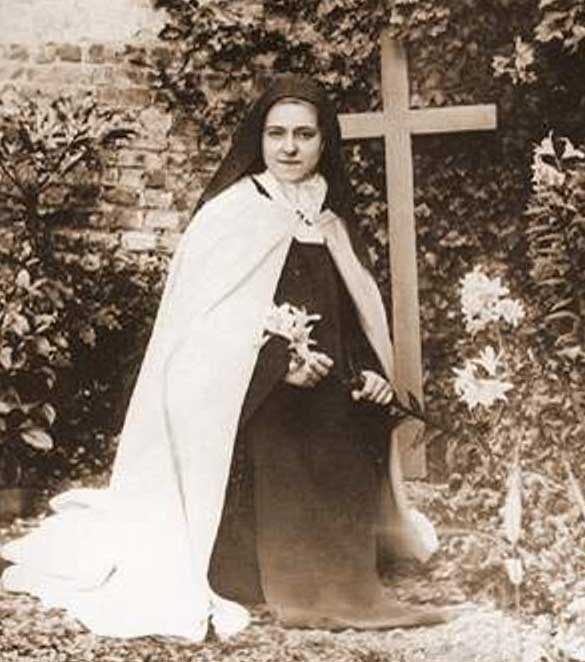
Day 1
St. Therese you have said:
“I understood that every flower created by him is beautiful, that the brilliance of the rose and the whiteness of the lily do not lessen the perfume of the violet or the sweet simplicity of the daisy. I understood that if all the lowly flowers wished to be roses, nature would no longer be enamelled with lovely hues. And so it is in the world of souls, our lord’s living garden.â€
Saint Therese, flower of Carmel,
you said you would spend your heaven
doing good upon the earth.
Your trust in God was complete.
Listen to my prayer;
bring before God my special intention…
Pray for me that I may have something of your confidence
in the loving promises of our God.
Pray that I may live my life in union with God’s plan for me,
and one day see the Face of God who you so ardently loved.
Saint Therese,
you kept your word to love God
and to trust the world to that loving providence.
Pray for us that we may be faithful to our commitment to love.
May our lives, like yours,
be able to touch the world and bring it to peace.
Amen
Tags: catholic, catholic podcast, catholic prayer, cathollc spirituality
This entry was posted on Tuesday, September 23rd, 2014 at 12:28 pm
You can follow any responses to this entry through the RSS 2.0 feed.
[powerpress]
Join Msgr. John Esseff, as he offers this novena in honor of St. Pio
The entire novena can be found on the The St. Pio of Pietrelcina (Padre Pio) Discerning Hearts Page
Day 9
From the writings of St. Pio:
How fortunate we are to be slaves of this great God who submitted Himself to death for us.
Tags: catholic, catholic podcast, catholic prayer, cathollc spirituality, darkness, death, Jesus, love
This entry was posted on Tuesday, September 23rd, 2014 at 5:24 am
You can follow any responses to this entry through the RSS 2.0 feed.
Episode 6 “What am I to do?†The Discernment of God’s Will in Everyday Decisions w/Fr. Timothy Gallagher
This episode offers Fr. Gallagher discusses the call to the marriage vocation and the call to the religious life. Â What are the differences found in each and how do we begin to discern our call.
For other episodes in the series visit The Discerning Hearts “Discerning the Will of God†page
Father Timothy M. Gallagher, O.M.V., was ordained in 1979 as a member of the Oblates of the Virgin Mary, a religious community dedicated to retreats and spiritual formation according to the Spiritual Exercises of St. Ignatius. Â Fr. Gallagher is featured on the EWTN series “Living the Discerning Life: Â The Spiritual Teachings of St. Ignatius of Loyola”.
For more information on how to obtain copies of Fr. Gallaghers’s various books and audio which are available for purchase, please visit  his  website:   frtimothygallagher.org
For the other episodes in this series check out Fr. Timothy Gallagher’s “Discerning Hearts†page
Tags: catholic, catholic podcast, catholic prayer, cathollc spirituality
This entry was posted on Monday, September 22nd, 2014 at 1:06 pm
You can follow any responses to this entry through the RSS 2.0 feed.
[powerpress]
Join Msgr. John Esseff, as he offers this novena in honor of St. Pio
The entire novena can be found on the The St. Pio of Pietrelcina (Padre Pio) Discerning Hearts Page
Day 8
Is it possible that you are never satisfied with yourself?  Jesus loves you with a loving partiality in spite of all your unworthiness.  He sends down a torrent of graces upon you, and yet you complain.  It is about time this ended and you convinced yourself that you are greatly in the Lord’s debt.  Hence, less complaints, more gratitude, and a great deal of thanksgiving.  You ought to ask Our Lord for just one thing: to love Him.  All the rest should be thanksgiving.
Tags: catholic, catholic podcast, catholic prayer, cathollc spirituality
This entry was posted on Monday, September 22nd, 2014 at 12:56 pm
You can follow any responses to this entry through the RSS 2.0 feed.
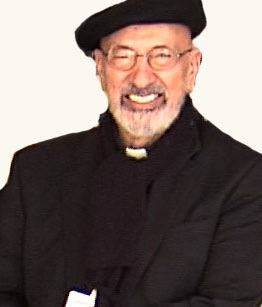 BKL 75 ” Building a Kingdom of Love” – “What was the wage earned?  Heaven!” Â
BKL 75 ” Building a Kingdom of Love” – “What was the wage earned?  Heaven!” Â
[powerpress]
Reading 2 Â PHIL 1:20C-24, 27A
Brothers and sisters:
Christ will be magnified in my body, whether by life or by death.
For to me life is Christ, and death is gain.
If I go on living in the flesh,
that means fruitful labor for me.
And I do not know which I shall choose.
I am caught between the two.
I long to depart this life and be with Christ,
for that is far better.
Yet that I remain in the flesh
is more necessary for your benefit.
Only, conduct yourselves in a way worthy of the gospel of Christ.
Gospel   MT 20:1-16A
“The kingdom of heaven is like a landowner
who went out at dawn to hire laborers for his vineyard.
After agreeing with them for the usual daily wage,
he sent them into his vineyard.
Going out about nine o’clock,
the landowner saw others standing idle in the marketplace,
and he said to them, ‘You too go into my vineyard,
and I will give you what is just.’
So they went off.
And he went out again around noon,
and around three o’clock, and did likewise.
Going out about five o’clock,
the landowner found others standing around, and said to them,
‘Why do you stand here idle all day?’
They answered, ‘Because no one has hired us.’
He said to them, ‘You too go into my vineyard.’
When it was evening the owner of the vineyard said to his foreman,
‘Summon the laborers and give them their pay,
beginning with the last and ending with the first.’
When those who had started about five o’clock came,
each received the usual daily wage.
So when the first came, they thought that they would receive more,
but each of them also got the usual wage.
And on receiving it they grumbled against the landowner, saying,
‘These last ones worked only one hour,
and you have made them equal to us,
who bore the day’s burden and the heat.’
He said to one of them in reply,
‘My friend, I am not cheating you.
Did you not agree with me for the usual daily wage?
Take what is yours and go.
What if I wish to give this last one the same as you?
Or am I not free to do as I wish with my own money?
Are you envious because I am generous?’
Thus, the last will be first, and the first will be last.â€
Msgr. John A. Esseff is a Roman Catholic priest in the Diocese of Scranton. He was ordained on May 30th 1953, by the late Bishop William J. Hafey, D.D. at St. Peter’s Cathedral in Scranton, PA. Msgr. Esseff served a retreat director and confessor to Blessed Mother Teresa. He continues to offer direction and retreats for the sisters of the missionaries of charity around the world. Msgr. Esseff encountered St. Padre Pio, who would become a spiritual father to him. He has lived in areas around the world, serving in the Pontifical missions, a Catholic organization established by Bl. Pope John Paul II to bring the Good News to the world especially to the poor. Msgr. Esseff assisted the founders of the Institute for Priestly Formation and continues to serve as a spiritual director for the Institute. He continues to serve as a retreat leader and director to bishops, priests and sisters and seminarians and other religious leaders around the world.   To obtain a copy of Msgr. Esseff’s book by visiting here  Be sure to visit Msgr. Esseff’s website “Building a Kingdom of Love“
 To obtain a copy of Msgr. Esseff’s book by visiting here  Be sure to visit Msgr. Esseff’s website “Building a Kingdom of Love“
Tags: catholic, catholic podcast, catholic prayer, cathollc spirituality
This entry was posted on Monday, September 22nd, 2014 at 12:35 pm
You can follow any responses to this entry through the RSS 2.0 feed.
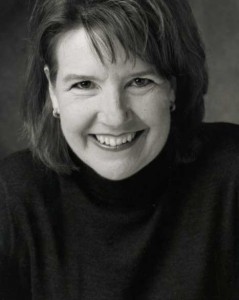 Episode 19- Seeking Truth with Sharon Doran -The Parables of Jesus (PART 2)
Episode 19- Seeking Truth with Sharon Doran -The Parables of Jesus (PART 2)
[powerpress]
Episode 20Â –
The Parables of Jesus (part 2)
Through His parables, Jesus both conceals and reveals.
As Sharon teaches us in this lecture,
Jesus uses the parables to reveal the truths of the Kingdom.
Yet, he conceals his true identity as Messiah so that his plan for salvation will not be thwarted before the appointed hour of his death on the cross.
As Sharon shows us, these parables have an even deeper richness when seen through Middle Eastern eyes. Understanding the cultural details contained in parables such as the Sower or the Prodigal Son helps us to appreciate the power of these amazing stories.
Sharon’s lecture breathes new life into our understanding of these familiar stories.
Sharon Doran serves as the teaching director of “Seeking Truth.†An experienced Bible Study teacher, Sharon has a passion for scripture that will motivate and challenge you to immerse yourself in God’s Word and apply His message to your every day life.
 “Seeking Truth†is an in depth Catholic Bible Study, commissioned by the Archdiocese of Omaha in response to John Paul II’s call to the New Evangelization as well as Pope Benedict XVI’s exhortation for all Catholics to study scripture. To learn more go to:www.seekingtruth.net
“Seeking Truth†is an in depth Catholic Bible Study, commissioned by the Archdiocese of Omaha in response to John Paul II’s call to the New Evangelization as well as Pope Benedict XVI’s exhortation for all Catholics to study scripture. To learn more go to:www.seekingtruth.net
Tags: catholic, catholic podcast, catholic prayer, cathollc spirituality
This entry was posted on Monday, September 22nd, 2014 at 11:08 am
You can follow any responses to this entry through the RSS 2.0 feed.
[powerpress]
Join Msgr. John Esseff, as he offers this novena in honor of St. Pio
The entire novena can be found on the The St. Pio of Pietrelcina (Padre Pio) Discerning Hearts Page
Day 7
May the Grace and peace of the Holy Spirit always be at the center of your heart. Place your heart in the open side of the Savior, and unite it with the King of your heart who is within it as on a royal throne, in order that He might receive homage and obedience from all other hearts. Keep your hearts door open, so that everyone can approach Him and gain an audience at all times. May the King of all saints also be the King of your heart!
Tags: catholic, catholic podcast, catholic prayer, cathollc spirituality
This entry was posted on Sunday, September 21st, 2014 at 12:56 am
You can follow any responses to this entry through the RSS 2.0 feed.



